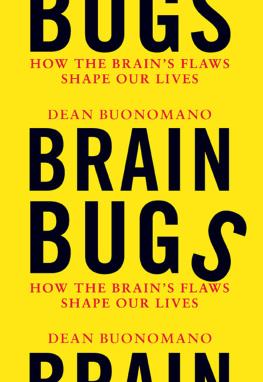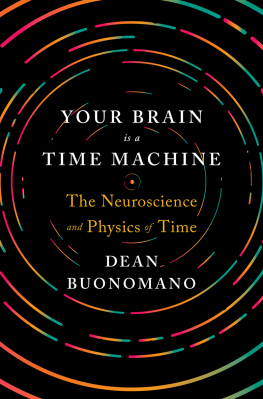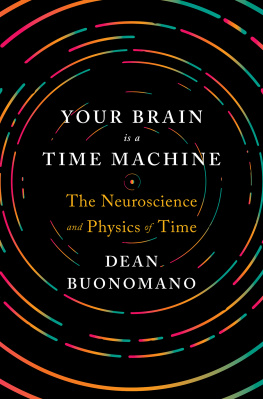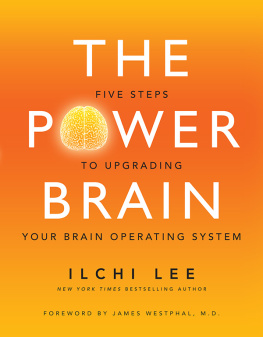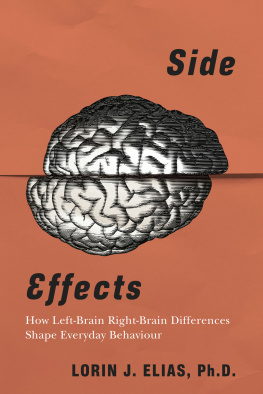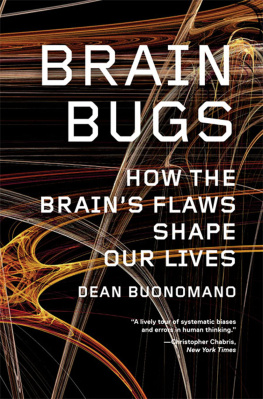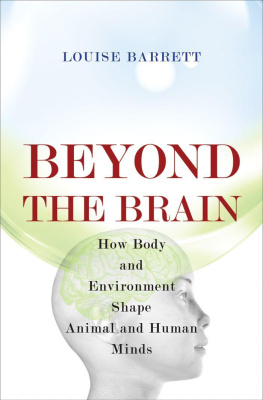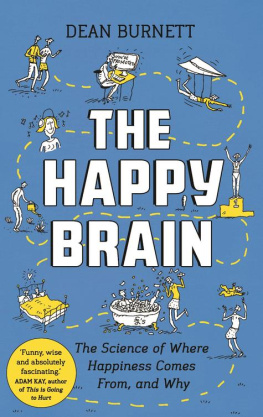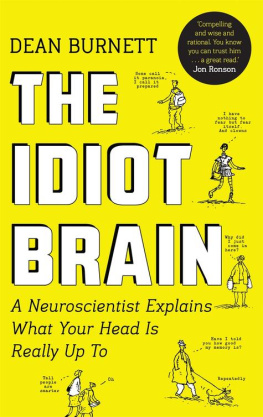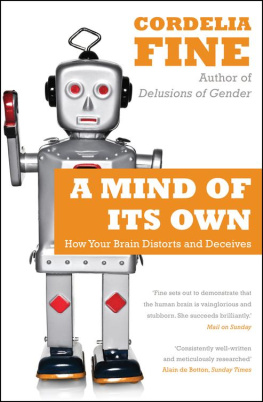Dean Buonomano - Brain Bugs: How the Brains Flaws Shape Our Lives
Here you can read online Dean Buonomano - Brain Bugs: How the Brains Flaws Shape Our Lives full text of the book (entire story) in english for free. Download pdf and epub, get meaning, cover and reviews about this ebook. year: 2011, publisher: W. W. Norton & Company, genre: Romance novel. Description of the work, (preface) as well as reviews are available. Best literature library LitArk.com created for fans of good reading and offers a wide selection of genres:
Romance novel
Science fiction
Adventure
Detective
Science
History
Home and family
Prose
Art
Politics
Computer
Non-fiction
Religion
Business
Children
Humor
Choose a favorite category and find really read worthwhile books. Enjoy immersion in the world of imagination, feel the emotions of the characters or learn something new for yourself, make an fascinating discovery.
- Book:Brain Bugs: How the Brains Flaws Shape Our Lives
- Author:
- Publisher:W. W. Norton & Company
- Genre:
- Year:2011
- Rating:3 / 5
- Favourites:Add to favourites
- Your mark:
- 60
- 1
- 2
- 3
- 4
- 5
Brain Bugs: How the Brains Flaws Shape Our Lives: summary, description and annotation
We offer to read an annotation, description, summary or preface (depends on what the author of the book "Brain Bugs: How the Brains Flaws Shape Our Lives" wrote himself). If you haven't found the necessary information about the book — write in the comments, we will try to find it.
Brain Bugs: How the Brains Flaws Shape Our Lives — read online for free the complete book (whole text) full work
Below is the text of the book, divided by pages. System saving the place of the last page read, allows you to conveniently read the book "Brain Bugs: How the Brains Flaws Shape Our Lives" online for free, without having to search again every time where you left off. Put a bookmark, and you can go to the page where you finished reading at any time.
Font size:
Interval:
Bookmark:
HOW THE BRAINS FLAWS SHAPE OUR LIVES
W. W. NORTON & COMPANY  NEW YORK
NEW YORK  LONDON
LONDON
Copyright 2011 by Dean Buonomano
All rights reserved
For information about permission to reproduce selections from this book, write to Permissions, W. W. Norton & Company, Inc., 500 Fifth Avenue, New York, NY 10110
Library of Congress Cataloging-in-Publication Data
Buonomano, Dean.
Brain bugs: how the brains flaws shape our lives / Dean Buonomano.1st ed.
p. cm.
Includes bibliographical references and index.
ISBN: 978-0-393-08195-4
1. BrainPhysiology. 2. MemoryPhysiological aspects. I. Title.
QP376.B86 2011
612.82dc23
2011014934
W. W. Norton & Company, Inc.
500 Fifth Avenue, New York, N.Y. 10110
www.wwnorton.com
W. W. Norton & Company Ltd.
Castle House, 75/76 Wells Street, London W1T 3QT
To my parents, Lisa, and Ana
It has been just so in all my inventions. The first step is an intuitionand comes with a burst, then difficulties arise. This thing gives out and then thatBugsas such little faults and difficulties are called.
Thomas Edison
The human brain is the most complex device in the known universe, yet it is an imperfect one. And, ultimately, who we are as individuals and as a society is defined not only by the astonishing capabilities of the brain but also by its flaws and limitations. Consider that our memory can be unreliable and biased, which at best leads us to forget names and numbers, but at worse results in innocent people spending their lives in prison as a result of faulty eyewitness testimony. Consider our susceptibility to advertising, and that one of the most successful marketing campaigns in history contributed to an estimated 100 million deaths in the twentieth century; the tragic success of cigarette advertising reveals the degree to which our desires and habits can be shaped by marketing. We often succumb to the lure of instant gratification at the expense of our long-term well-being, and our irrepressible tendency to engage in supernatural beliefs often leads us astray. Even our fears are only tenuously related to what we should fear.
The outcome of these facts is that what we presume to be rational decisions are often anything but. Simply put, our brain is inherently well suited for some tasks, but ill suited for others. Unfortunately, the brains weaknesses include recognizing which tasks are which, so for the most part we remain ignorantly blissful of the extent to which our lives are governed by the brains bugs .
The brain is an incomprehensibly complex biological computer, responsible for every action we have taken and every decision, thought, and feeling weve ever had. This is probably a concept that most people do not find comforting. Indeed, the fact that the mind emerges from the brain is something not all brains have come to accept. But our reticence to acknowledge that our humanity derives solely from the physical brain should not come as a surprise. The brain was not designed to understand itself anymore than a calculator was designed to surf the Web.
The brain was designed to acquire data from the external world through our sensory organs; to analyze, store, and process this information; and to generate outputsactions and behaviorsthat optimize our chances of survival and reproduction. But as with any other computational device the brain has bugs and limitations.
For convenience, rather than scientific rigor, I borrow the term bugs from the computer lexicon to refer to the full range of limitations, flaws, foibles, and biases of the human brain. The consequences of computer bugs range from annoying glitches in screen graphics to the computers freezing or the blue screen of death. Occasionally computer bugs can have fatal consequences, as in cases where poorly written software has allowed lethal doses of radiation to be delivered to patients during cancer therapy. The consequences of the brains bugs can be equally wide ranging: from simple illusions, to annoying memory glitches, to irrational decisions whose effects can just as likely be innocuous as fatal.
If there is a bug in your favorite software program, or an important feature is absent, there is always hope that the issue will be remedied in the next version, but animals and humans have no such luxury; there are no instant-fix patches, updates, or upgrades when it comes to the brain. If it were possible, what would be on the top of your brain upgrade list? When one asks a classroom of undergraduate students this question, invariably the answer is to have a better memory for the names, numbers, and facts that they are bombarded with (although a significant contingent of students ingenuously opts for mind reading). We have all struggled, at some point, to come up with the name of somebody we know, and the phrase You knowwhats his name? may be among the most used in any language. But complaining that you have a bad memory for names or numbers is a bit like whining about your smartphone functioning poorly underwater. The fact of the matter is that your brain was simply not built to store unrelated bits of information, such as lists of names and numbers.
Think back to someone you met only once in your lifeperhaps someone you sat next to on an airplane. If that person told you his name and profession, do you think you would be equally likely to remember both these pieces of information, or more likely to remember one over the other? In other words, are you an equal opportunity forgetter, or for some reason are you more likely to forget names than professions? A number of studies have answered this question by showing volunteers pictures of faces along with the surname and profession of each person depicted. When the same pictures were shown again during the test phase, subjects were more likely to remember peoples professions than their names. One might venture that this is because the professions were simpler to remember for some reason; perhaps they are more commonly used wordsa factor known to facilitate recall. As a clever control however, some of the words were used either as names or professions; for instance, Baker/baker or Farmer/farmer could have been used as the name or the occupation. Still, people were much more likely to remember that someone was a baker than that he was Mr. Baker .
As another example of the quirks of human memory, read the following list of words:
candy, tooth, sour, sugar, good, taste, nice, soda, chocolate, heart, cake, honey, eat, pie
Now read them again and take a few moments to try to memorize them.
Which of the following words was on the list: tofu, sweet, syrup, pterodactyl?
Even if you were astute enough to realize that none of these four words was on the list, there is little doubt that sweet and syrup gave you more of a mental pause than tofu and pterodactyl . Why would it be harder to remember that the person you met on the plane is named Baker than that he is a baker? Why are we prone to confuse words and names that are closely associated with each other? We will see that the answer to both these questions is a direct consequence of the associative architecture of the human brain.
BUGS VERSUS FEATURES
Like a sundial and a wristwatch that share nothing except their purpose for being, digital computers and brains share little other than the fact that they are both information processing devices. Even when a digital computer and biological computer are working on the same problem, as occurs when a computer and a human play chess (generally to the consternation of the latter), the computations being performed have little in common. One performs a massive brute force analysis of millions of possible moves, while the other relies on its ability to recognize patterns to guide a deliberate analysis of a few dozen.
Font size:
Interval:
Bookmark:
Similar books «Brain Bugs: How the Brains Flaws Shape Our Lives»
Look at similar books to Brain Bugs: How the Brains Flaws Shape Our Lives. We have selected literature similar in name and meaning in the hope of providing readers with more options to find new, interesting, not yet read works.
Discussion, reviews of the book Brain Bugs: How the Brains Flaws Shape Our Lives and just readers' own opinions. Leave your comments, write what you think about the work, its meaning or the main characters. Specify what exactly you liked and what you didn't like, and why you think so.

